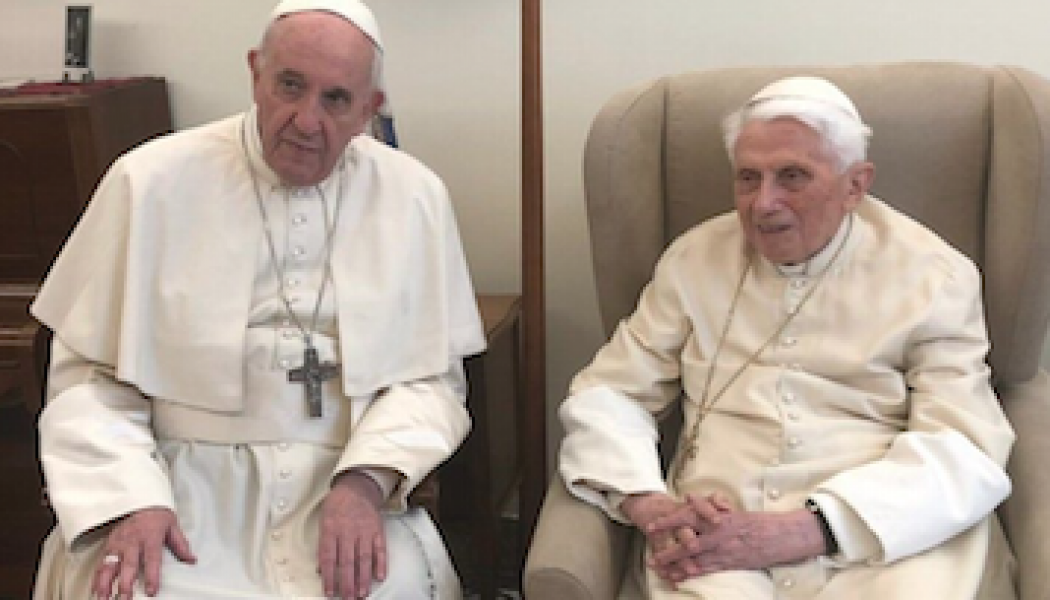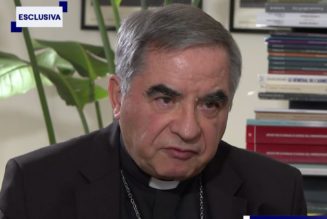
> Italiano
> English
> Español
> Français
> All the articles of Settimo Cielo in English
*
What is most striking in the post-synodal apostolic exhortation “Querida Amazonia,” made public today, February 12 2020, is its total silence on the most anticipated and controversial issue: the ordination of married men.
Not even the word “celibacy” appears in it. Pope Francis desires “to configure ministry in such a way that it is at the service of a more frequent celebration of the Eucharist, even in the remotest and most isolated communities” (no. 86). But he reiterates (no. 88) that only the ordained priest can celebrate the Eucharist, absolve from sins and administer the anointing of the sick (because it too is “intimately linked to the forgiveness of sins,” footnote 129). And it says nothing about the extension of ordination to “viri probati.”
No news on women’s ministries either. “If they were admitted to Holy Orders,” Francis writes in no. 100, “it would lead us to clericalize women” and to “restrict our understanding of the Church to her functional structures.”
The curiosity that arises immediately, from reading “Querida Amazonia,” is therefore to understand to what extent the bombshell book written by pope emeritus Benedict XVI and by Cardinal Robert Sarah in defense of the celibacy of the clergy, published in mid-January, influenced the exhortation and in particular its silence on the ordination of married men.
To this end, some more information than what is already known about what happened in the fiery days following the publication of the book should be added.
The already known sequence of events was documented by Settimo Cielo in the three “Post Scriptum” at the end of this article of January 13:
> Ancora sul libro bomba di Ratzinger e Sarah. Con il resoconto di un nuovo incontro tra i due
But from multiple independent sources Settimo Cielo subsequently received news of at least four more facts, of very substantial importance.
*
The first occurred on the morning of Wednesday January 15.
All throughout the day of Tuesday the 14th the attack carried out by the radical movements against Ratzinger and Sarah had built up to a devastating crescendo, fueled in fact by the repeated denials of the prefect of the pontifical household, Georg Gänswein, of a co-responsibility of the pope emeritus in the composition and publication of the book, to the point of requesting the withdrawal of his signature, and contrasted to no avail by the precise and documented reconstruction, made public by Sarah, of the genesis of the book itself by the united efforts of its two coauthors.
So then, on the morning of Wednesday January 15, while Pope Francis was holding his weekly general audience with Gänswein sitting as usual at his side in the Paul VI hall, and therefore far from the Mater Ecclesiae monastery which is the residence of the pope emeritus whose secretary he is, Benedict XVI picked up the phone himself and called Sarah first at home, where he did not find him, and then at the office, where the cardinal answered.
Benedict XVI expressed his heartfelt solidarity with Sarah. He confided that he could not understand the reasons for such violent and unjust aggression. And he wept. Sarah wept too. The call ended with both of them in tears.
*
The second fact disclosed here for the first time occurred during the meeting between Sarah and Ratzinger, at the latter’s residence, on the evening of Friday January 17.
That very evening, the cardinal reported on the meeting in three tweets, in which he confirmed the perfect harmony between himself and the pope emeritus in the publication of the book.
But he did not say that during that same meeting – actually held in two distinct segments, first at 5 pm and then at 7 – Benedict XVI had written together with him a concise statement that was intended to be made public with the sole signature of the pope emeritus, to certify the full consonance between the two coauthors of the book and call for the cessation of all controversy.
For the purpose of publication, Gänswein delivered the statement – which Settimo Cielo has in possession and in which Ratzinger’s personal, even autobiographical, trait is evident – to substitute secretary of state Edgar Peña Parra. And it is reasonable to hypothesize that he informed both his direct superior, Cardinal Pietro Parolin, and Pope Francis himself about it.
*
The fact remains – and it is the third piece of news as yet unpublished – that this statement of the pope emeritus has never seen the light of day. But it was arguably the origin of Francis’s decision to exempt papal household prefect Gänswein from any visible presence at his side from that point on.
The last of these public appearances dates back to the morning of that same Friday January 17, on the occasion of the visit to the Vatican of the president of the Democratic Republic of the Congo. After which Gänswein no longer appeared alongside the pope, neither at the Wednesday general audiences nor at the official visits of American vice president Mike Pence, Iraqi president Barham Salih, and Argentine president Alberto Fernández.
In the eyes of Pope Francis, Benedict XVI’s statement had in fact proven the unreliability of the repeated denials made by Gänswein of the pope emeritus’s co-responsibility in the composition of the book.
In other words, the opposition of the pope emeritus against his successor giving in to the radical currents on the front of clerical celibacy stood out at this point front and center, without any attenuation anymore.
And all this a few days before the publication of the post-synodal exhortation in which many, all over the world, were expecting to read an opening by Francis to the ordination of married men.
*
As a corollary to all this, news should also be given of the role that Cardinal Parolin played in this affair.
When in fact on Wednesday January 22 the publisher Cantagalli released a statement regarding the imminent debut of the book in Italy, with just a few trivial changes compared to the French original, it was not said that the statement had been viewed in advance and burnished line by line by the cardinal secretary of state, who at last had strongly encouraged its publication.
A press release in which Ratzinger and Sarah’s book is defined as “a volume of high theological, biblical, spiritual and human value, guaranteed by the depth of the authors and their willingness to make the fruit of their respective reflections available to all, manifesting their love for the Church, for His Holiness Pope Francis and for all humanity.”








